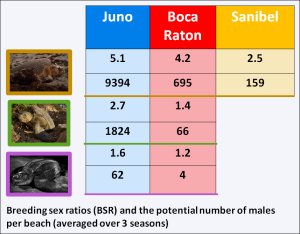Grant: 15-031R
Project Title: Mating system determinatation of imperiled marine turtles and an assessment of operational sex ratio
Project Manager: Dr. Jeanette Wyneken & Jacob Lasala
Organization: Florida Atlantic University (Research and Educational Institute)
Grant Amount: $11,745.83
Completion Date: 2020-11-30
Summary: Defining a species mating system is critical to understanding its ecology and
enhances our ability of conservation. Marine turtle mating systems vary among species and
between nesting populations. In the current study, we propose to use paternity analyses to
determine the mating systems of three imperiled marine turtle species (loggerhead, greens and
leatherbacks) that nest on three beaches in southern Florida from 2013-2016. Exclusion paternity
analysis will be used to determine potential male genotypes in high nesting locations. The
resulting male contributions within clutches will assist us in describing the operational sex ratio
of each nesting population and their effective population size, to provide a better understanding
of the actively mating individuals within these populations nesting in Florida. The results will
improve our understanding of mating behavior and how it relates to overall population health. Results: For our sample collection, we collected samples from three species of marine turtle (Loggerheads, Greens and Leatherbacks) on three different beaches. In 2014, We sampled a total of 1840 turtles. This grant allowed us to analyze those samples and collect, process and analyze the 2015 samples. At the Juno Beach site, he collected samples from 16 loggerhead females and 336 hatchlings, 10 green turtle females and 174 hatchlings and 28 leatherback females and 231 hatchlings. In Boca Raton he collected samples from 5 loggerhead females and 470 hatchlings, 8 green females and 294 hatchlings and 6 leatherback females and 99 hatchlings. Finally in Sanibel he sampled 20 loggerhead females and 363 hatchlings. Together the total number of samples was 2,060. The 2015 sample sizes were adjusted to accommodate hatching schedules (because of differences in incubation durations among sites and species, this change was logistically necessary). Further, some nests were lost to predators, human interference (nest stake removal) and poor nest success associated with weather events, particularly high incubation temperatures. Nevertheless, even with a slightly lower sampling than planned, the majority of the 2015 samples were usable and analyzed for genotyping.
Results: For our sample collection, we collected samples from three species of marine turtle (Loggerheads, Greens and Leatherbacks) on three different beaches. In 2014, We sampled a total of 1840 turtles. This grant allowed us to analyze those samples and collect, process and analyze the 2015 samples. At the Juno Beach site, he collected samples from 16 loggerhead females and 336 hatchlings, 10 green turtle females and 174 hatchlings and 28 leatherback females and 231 hatchlings. In Boca Raton he collected samples from 5 loggerhead females and 470 hatchlings, 8 green females and 294 hatchlings and 6 leatherback females and 99 hatchlings. Finally in Sanibel he sampled 20 loggerhead females and 363 hatchlings. Together the total number of samples was 2,060. The 2015 sample sizes were adjusted to accommodate hatching schedules (because of differences in incubation durations among sites and species, this change was logistically necessary). Further, some nests were lost to predators, human interference (nest stake removal) and poor nest success associated with weather events, particularly high incubation temperatures. Nevertheless, even with a slightly lower sampling than planned, the majority of the 2015 samples were usable and analyzed for genotyping.